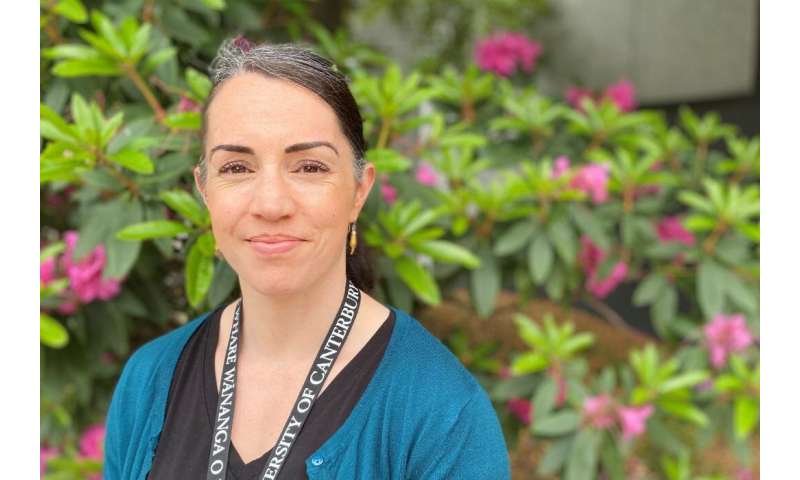Stories of Māori adoption explored in new UC research

Being adopted as a Māori baby into a Pākehā family is an experience that has shaped the rest of Annabel Ahuriri-Driscoll's life.
The University of Canterbury (UC) lecturer in Māori Health and Wellbeing has investigated the impact of this experience on other Māori adults who, like her, were adopted under closed adoption rules between 1960 and 1976.
She has interviewed 15 men and women around the country over the past nine years for her Ph.D. in Health Sciences, which she will graduate with in December. Three of the participants were adopted into families with a Māori parent but the majority were brought up by Pākehā adoptive parents.
The effect on them was profound, leaving them without knowledge of their whakapapa and feeling they were missing an essential part of their identity, Ahuriri-Driscoll says.
"For those who grew up in a Pākehā world with no connection to the Māori world they felt like outsiders. Most of my study participants were visibly Māori, it wasn't something they could hide so they always knew they were different physically and racially. But for others their appearance was a little more ambiguous.
"I wanted to find out what it means for people when they grow up with this lack of knowledge about their birth family and their whakapapa. And when they did meet their birth families, what was that like, and what happens in the long term when you have a family of your own?
"As an adoptee with a Māori birth father I was particularly passionate about it. For me there were a lot of unanswered questions about closed adoption, what happened and why. It went on for 30 years, and it affected tens of thousands of people."
Adoption can already cause feelings of loss, grief, and not fitting in, but growing up with parents of different ethnicity to your own magnifies those emotions, she says.
"It's like being doubly colonised if your Māori-ness is denied or talked about in a particular way."
Very few of the people she interviewed experienced overt racism from their families and some of the adoptive Pākehā parents supported their children in learning te reo Māori.
"They really did feel loved by their Pākehā adoptive parents and felt they had done the best they could with no information or support from Social Welfare," Ahuriri-Driscoll says. "But ultimately there was that disconnection and they've spent all of their adult lives trying to reconnect to the Māori world."
For those who did grow up with Māori parents, the Māori world and culture was not completely foreign and it had some presence in their lives.
Ahuriri-Driscoll's birth mother was Pākehā and her birth father was Māori. She didn't meet the Ahuriri side of her family, now based in Tokoroa, until she was in her late teens.
Most of the study participants, like her, had Pākehā mothers and Māori birth fathers—only three had Māori mums. All of those she interviewed had met or knew of their birth mothers, but four did not know the identities of their Māori birth fathers.
"A couple of my participants talk about the awkwardness of meeting their birth families. There was a feeling that this was a liaison that was, or had been, frowned upon—their daughter falling pregnant to a Māori boy," she says.
"For my family it has been a happy ending but it's not straight forward. The ironic and sad thing for me is that the relationship between adoptee and birth mother, the two people arguably most affected by adoption, is often so fraught because of the pain, emotion and stigma involved. That makes an easy relationship impossible.
"Because the fathers were that much more removed they haven't necessarily got all that emotional baggage. They can say, 'I'm your friend, and we can have a good relationship'."
Closed adoptions happened under the Adoption Act of 1955 until new legislation was introduced in 1985 that enabled adult adoptees access to their birth information, and there was a concurrent opening up of the process.
Ahuriri-Driscoll says official figures are hard to find but she estimates about 80,000 children were adopted in the 30 years between 1955 and 1985. Under closed adoption rules their birth records were sealed until they reached the age of 20. She believes a significant proportion of these adoptions would have been Māori babies adopted by Pākehā families.
All of her study participants have reconnected with Māori culture, in some form, later in life, but the alienation of growing up without Māori culture or whānau is, in a way, irreversible, she says. "They've tried to learn te reo, they've met with birth families, but they've talked about the fact that it's not been easy and they haven't felt entirely comfortable in the Māori world.
"Or they've not been recognised by other Māori as being Māori. They feel that they can't call themselves culturally Māori because they've been brought up Pākehā."
Despite the struggles that Ahuriri-Driscoll's participants shared with respect to their adoptive histories, they also shared stories of strength that illuminate an important period of New Zealand history and social policy, she says.
"It is imperative that we critically reflect on closed adoption and its effects, because much of the underpinning thinking persists today. Closed adoption was the 'respectable' end of indigenous child removal, something that is being considered in the current Royal Commission, but that has not been given sufficient attention."
Annabel Ahuriri-Driscoll's 2020 thesis is titled "Ka Tū te Whare, Ka Ora: The Constructed and Constructive Identities of the Māori Adoptee, Identity construction in the context of Māori adoptees' lived experiences."
Provided by University of Canterbury